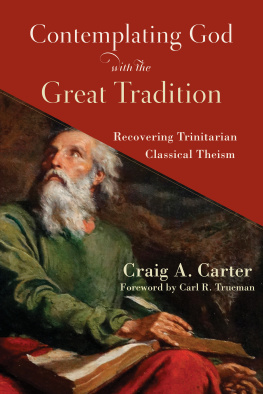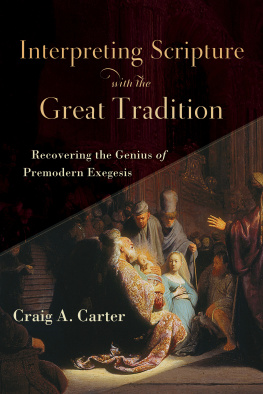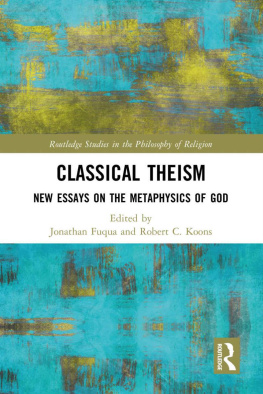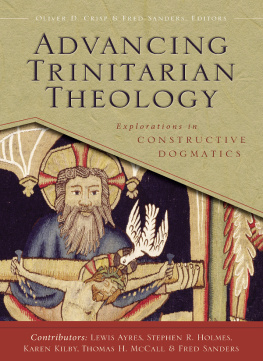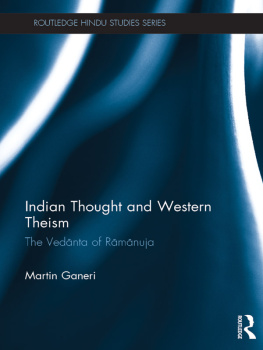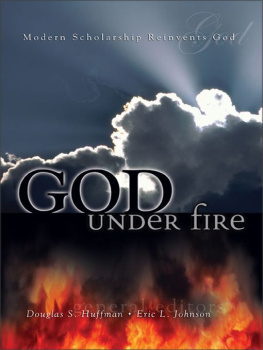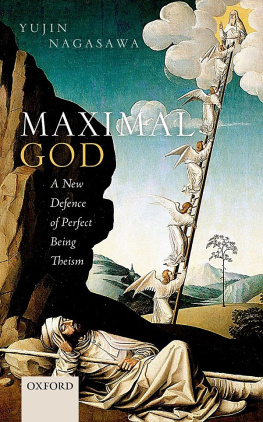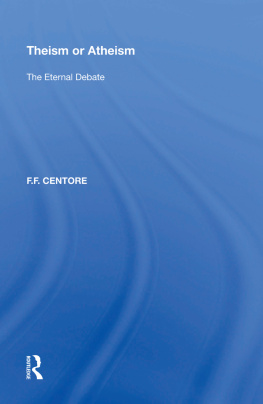Craig A. Carter - Contemplating God with the Great Tradition: Recovering Trinitarian Classical Theism
Here you can read online Craig A. Carter - Contemplating God with the Great Tradition: Recovering Trinitarian Classical Theism full text of the book (entire story) in english for free. Download pdf and epub, get meaning, cover and reviews about this ebook. year: 2021, publisher: Baker Publishing Group, genre: Religion. Description of the work, (preface) as well as reviews are available. Best literature library LitArk.com created for fans of good reading and offers a wide selection of genres:
Romance novel
Science fiction
Adventure
Detective
Science
History
Home and family
Prose
Art
Politics
Computer
Non-fiction
Religion
Business
Children
Humor
Choose a favorite category and find really read worthwhile books. Enjoy immersion in the world of imagination, feel the emotions of the characters or learn something new for yourself, make an fascinating discovery.
- Book:Contemplating God with the Great Tradition: Recovering Trinitarian Classical Theism
- Author:
- Publisher:Baker Publishing Group
- Genre:
- Year:2021
- Rating:4 / 5
- Favourites:Add to favourites
- Your mark:
- 80
- 1
- 2
- 3
- 4
- 5
Contemplating God with the Great Tradition: Recovering Trinitarian Classical Theism: summary, description and annotation
We offer to read an annotation, description, summary or preface (depends on what the author of the book "Contemplating God with the Great Tradition: Recovering Trinitarian Classical Theism" wrote himself). If you haven't found the necessary information about the book — write in the comments, we will try to find it.
Craig A. Carter: author's other books
Who wrote Contemplating God with the Great Tradition: Recovering Trinitarian Classical Theism? Find out the surname, the name of the author of the book and a list of all author's works by series.
Contemplating God with the Great Tradition: Recovering Trinitarian Classical Theism — read online for free the complete book (whole text) full work
Below is the text of the book, divided by pages. System saving the place of the last page read, allows you to conveniently read the book "Contemplating God with the Great Tradition: Recovering Trinitarian Classical Theism" online for free, without having to search again every time where you left off. Put a bookmark, and you can go to the page where you finished reading at any time.
Font size:
Interval:
Bookmark:
For decades evangelicals have been absorbing relational theism and have assumed that it is consistent with the biblical witness. Craig Carter exposes this faulty assumption, revealing social trinitarianisms radical inconsistency with Scriptures own presentation of the triune God. Thankfully, Carter also knows the antidote and summons us back to classical Christianity. Only by taking ressourcement seriously and sitting with hermeneutical humility at the feet of the Great Tradition can we escape the captivity of modern manipulations of the Trinity.
Matthew Barrett , Midwestern Baptist Theological Seminary; author of Simply Trinity
With an insiders knowledge of modern relational theism, Carter is able to bring into sharp relief the choice that the church faces in its doctrine of God, a choice as vital as the one it faced in the fourth century. Will it return to trinitarian classical theism, or will it collapse God into the world and consign itself to the degenerative oblivion faced by pagan modernity and the liberal theological project that piggybacks upon it? Carter blends exegesis with sweeping cultural analysis to provide by both instruction and example an inspiring vision of the Christian doctrine of God as it should be done.
Garry J. Williams , director of the Pastors Academy at London Seminary
By revisiting the doctrines behind classical theismNicene orthodoxyCarter takes readers on a journey to the past on a path that leads to the future. We have much to learn from the Nicene fathers: the exegesis, theology, and metaphysics that inform their doctrine of God is biblical and true. For those who love classical theism, this book serves as a welcome enchiridion; for those who are drawn to revisionary doctrines of God, this book serves as a worthy dialogue partner; and for anyone who wants to know the God of Scripture, this book is must reading.
J. V. Fesko , Reformed Theological Seminary, Jackson, Mississippi
2021 by Craig A. Carter
Published by Baker Academic
a division of Baker Publishing Group
PO Box 6287, Grand Rapids, MI 49516-6287
www.bakeracademic.com
Ebook edition created 2021
All rights reserved. No part of this publication may be reproduced, stored in a retrieval system, or transmitted in any form or by any meansfor example, electronic, photocopy, recordingwithout the prior written permission of the publisher. The only exception is brief quotations in printed reviews.
Library of Congress Cataloging-in-Publication Data is on file at the Library of Congress, Washington, DC.
ISBN 978-1-4934-2969-1
Unless otherwise indicated, all Scripture quotations are from The Holy Bible, English Standard Version (ESV), copyright 2001 by Crossway, a publishing ministry of Good News Publishers. Used by permission. All rights reserved. ESV Text Edition: 2016
To my students at Tyndale University,
who patiently listened as I thought my way through
the ideas in this book,
and especially to those who discovered along the way
that they were classical theists
Cover
Endorsements
Half Title Page
Title Page
Copyright Page
Dedication
Foreword by Carl R. Trueman
Acknowledgments
Abbreviations
Prologue: How My Mind Has Changed
Part 1: Defining Trinitarian Classical Theism
1. Classical Orthodoxy and the Rise of Relational Theism
2. What Is Trinitarian Classical Theism?
Part 2: The Biblical Roots of Trinitarian Classical Theism
3. Interpreting Isaiah 4048 Theologically
4. God as the Transcendent Creator (Isa. 40)
5. God as the Sovereign Lord of History (Isa. 4148)
6. God as the One Who Alone Is to Be Worshiped (Isa. 4148)
Part 3: Trinitarian Classical Theism in History
7. The Biblical Character of Pro-Nicene Theology
8. Creatio ex nihilo and the Rejection of Mythology
9. Do We Worship the God of the Bible?
Epilogue: Why the Church Does Not Change Its Mind
Bibliography
Index of Scripture
Index of Persons
Index of Subjects
Back Cover
Recent years have witnessed an unexpected but most welcome development within the ranks of conservative Protestant theology: the recovery of the classical doctrine of God as expressed in the early church creeds and the great confessions of the magisterial Reformation. For some generations, particularly evangelical Protestant theology has been dominated by biblical scholars who pursue the theological endeavor on the basis of biblical exegesis with little or no engagement with the theological tradition of the church. While this is perhaps understandable, given the Protestant commitment to Scripture alone as the norming norm of theology, it has also proved highly problematic in at least two ways: (1) ironically, it has served to detach evangelical Protestant thought from the orthodox Protestant tradition, and (2) it has done so because (again ironically) it has unwittingly adopted the antimetaphysical stance of the dominant Kantian trajectories of Western thought since the Enlightenment.
One example of this trend is the redemptive-historical method of interpretation that is now the default in many Reformed and evangelical circles. Building on the important truth that the Bible tells one basic soteriological story culminating in Christ, this approach has done sterling service in saving the Old Testament from both dispensationalism and a reductive moralism. But in focusing on the redemptive storyline, it has also tended to prioritize the narrative economy of Gods actions over the eternal ontology of his being and has thereby collapsed the transcendent into the immanent. It is not that the redemptive-historical approach is incorrect; rather, it is that it does not say enough and tends to ignore questions of metaphysics and ontology that (ironically) the Bibles own narrative itself raises.
This lack is often reflected in the default piety that always worships God for what he has done and rarely or never worships him for who he is. Of course, the former is vitalthe Psalms are replete with praise for Gods acts of creation, providence, and salvation. But they also contain references to his intrinsic holiness and glory. Our pietyand therefore the theology on which our piety rests and that motivates itmust also give due weight to Gods glorious, holy, praiseworthy being. It was, after all, exposure to God in his thrice holiness in the temple and not any specific act of God that drove an awestruck Isaiah to the ground in worship.
In this context, the recent renaissance of interest in the classical, creedal doctrine of God is to be welcomed. This is the teaching that has generated beautiful liturgies, fortified the church, and nurtured Christians for centuries. And yet many Christians are likely still perplexed by classical theism. They may be unfamiliar with J. P. Gabler and Adolf von Harnack, but they still share their suspicion that the abstruse and abstract language of Nicene trinitarianism and such ideas as immutability and impassibility subvert the reading of Scripture in order to buttress a doctrine of God that owes more to pagan philosophy than Gods self-revelation.
In such a context, Craig Carter is doing sterling service for the church. In his earlier volume, Interpreting Scripture with the Great Tradition , he made a compelling case for todays church to move beyond the narrow interests of the guild of contemporary evangelical biblical scholarship and seek once again to reconnect with how the church itself has read and understood the Bible over the centuries. In the present volume, Carter builds on Interpreting Scripture but presses in a more theological and methodological direction, seeking to demonstrate how classical theism is both demanded by the Bibles teaching and a constitutive element in how we read the Bible.
Font size:
Interval:
Bookmark:
Similar books «Contemplating God with the Great Tradition: Recovering Trinitarian Classical Theism»
Look at similar books to Contemplating God with the Great Tradition: Recovering Trinitarian Classical Theism. We have selected literature similar in name and meaning in the hope of providing readers with more options to find new, interesting, not yet read works.
Discussion, reviews of the book Contemplating God with the Great Tradition: Recovering Trinitarian Classical Theism and just readers' own opinions. Leave your comments, write what you think about the work, its meaning or the main characters. Specify what exactly you liked and what you didn't like, and why you think so.

